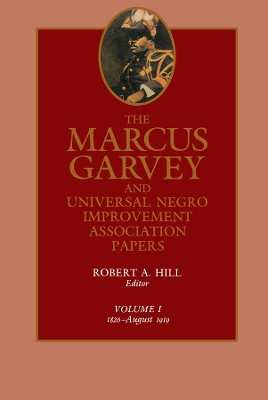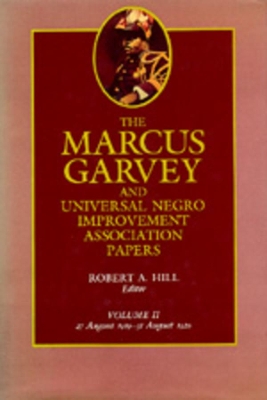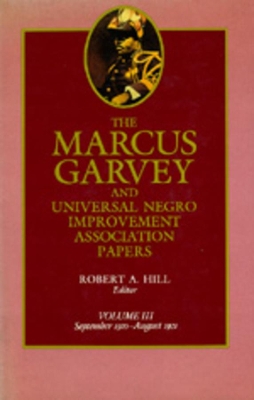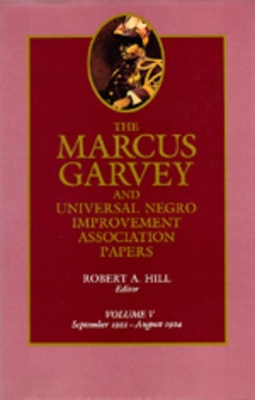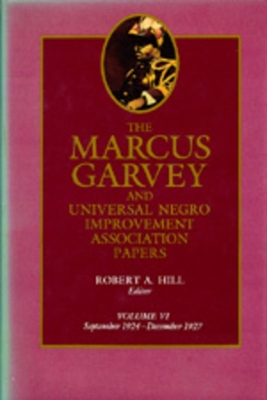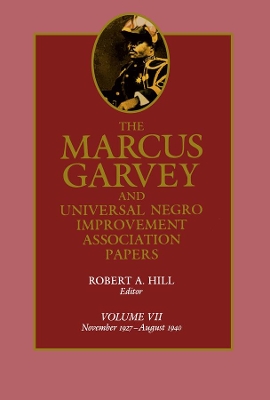Marcus Garvey and Universal Negro Improvement Association Pa
9 primary works
Book 1
The Marcus Garvey and Universal Negro Improvement Association Papers, Vol. I
by Marcus Garvey
Letters, pamphlets, vital records, intelligence reports, newspaper articles, speeches, legal records, and diplomatic dispatches are enhanced by Hill's descriptive source notes, explanatory footnotes, and comprehensive introduction. Of the over three hundred items included in Volume I, only very few have ever been published or reprinted before. Volume I begins with the earliest mentions in 1826 of the Garvey family in Jamaica's slave records, and closes with Garvey's triumphant address at Carnegie Hall on August 25, 1919. The information is fascinating and often startling, tracing Garvey's early career in Jamaica, Central America, Europe, and the United States, and detailing the first stirrings of what was to become an international mass movement. Hill presents complete documentation of the first official surveillance of the UNIA, which prepared the way for the beginning of the criminal and civil litigation that engulfed Garvey and his movement, as American and European governments reacted to the perceived threat with repressive policies.
The documents also record the internal structure and political splits during the early years of the UNIA, and provide the financial history of Garvey's controversial Black Star Line steamship venture, one of the schemes that ultimately led to the financial collapse of his movement. The first volume and the following five focus on America, the seventh and eighth on Mrica, and the last two on the Caribbean. The information Hill has compiled goes far beyond preoccupation with a single intriguing historical figure to document the growth and demise of a mass social phenomenon, an Mro-American protest movement with strong links to African and Caribbean nationalism in the first decades of the twentieth century.
Book 2
The Marcus Garvey and Universal Negro Improvement Association Papers, Vol. II
by Marcus Garvey
These controversial financial schemes led to Garvey's reputation as a swindler, and Volume II details the first charges of fraud. The federal investigation of Garvey broadened and deepened during 1919--1920, with J. Edgar Hoover--then an assistant to the attorney general--continuing to search tor grounds to deport Garvey. Included here are numerous repons from government agents and informers, which provide a valuable ponrait of day-to-day UNIA operations. Volume II ends with the UNIA's 1920 convention, presented by Garvey as a turning point in the history of black-white relations. The legislation and the elective offices produced by that convention were intended to form a virtual government in exile for Africa, fulfilling Garvey's ambition to practice statecraft and create the symbols of black nationhood and sovereignty. This volume is the second of six that focus on America; the seventh and eighth focus on Africa, and the last two on the Caribbean. Hill has brought together far more than a portrait of a single intriguing historical figure.
Garvey's movement was a mass social phenomenon, an Afro-American protest movement with strong links to African and Caribbean nationalism in the first decades of the twentieth century.
Book 3
The Marcus Garvey and Universal Negro Improvement Association Papers, Vol. III
by Marcus Garvey
Soon the entire Black Star Line enterprise hovered on the brink of bankruptcy and a steep decline in the shipping business made prospects for the Black Star Line even less promising. But Garvey capitalized on the momentum gathered at the August 1920 convention and spent much of his time in a new round of promotional tours devoted to selling Black Star Line stock, shoring up weak UNIA divisions, and chartering new ones. This gave J. Edgar Hoover his long-awaited opportunity to remove Garvey from the Afro-American political scene. When Garvey embarked on a promotional tour of the West Indies and Central America in February 1921, the United States government, with some assistance from the British, attempted to keep Garvey from returning to the country. Garvey's trip was to mark a turning point in the history of the UNIA. Garvey's lieutenants, who were charged with running the UNIA during his absence, frequently clashed over unclear lines of authority. This also created severe difficulties for the Black Star Line and the UNIA's Liberian project.
Under these circumstances, Garvey asked for and received, from the 1921 convention, control over all UNIA and Black Star Line finances as a means of centralizing all authority in his hands. At the same time Garvey launched an attack at the convention against those black leaders, including W. E. B. Du Bois, whom he perceived as opponents of the UNIA. He further initiated a controversial campaign to label these political opponents as advocates of "social equality" between the races, while offering as an alternative his philosophy of "racial purity." This volume is the third of six that focus on America; the seventh and eighth focus on Africa, and the last two on the Caribbean. In Volume III, Robert Hill documents the complexities and turmoil of the Garvey movement from 1920 to 1921, as an unfolding drama emerges that pits American and European political, diplomatic, and economic interests against the first comprehensive expression of the modern black struggle for freedom.
Book 4
Marcus Garvey and Universal Negro Improvement Association Papers, Vol. IV
by Marcus Garvey
Briggs, the leader of the African Blood Brotherhood, unwittingly supplied federal investigators with evidence that led to Garvey's indictment on charges of mail fraud in February 1922. By prosecuting him, however, the Department of Justice did not discredit Garvey in the eyes of his followers; rather, it temporarily strengthened his hold over the movement as the appearance of persecution intensified the loyalty of the UNIA membership. But later in 1922 Garvey did lose favor among many of his followers when it was disclosed that he had met secretly in Atlanta with the Acting Imperial Wizard of the Ku Klux Klan. What Garvey had thought was a diplomatic triumph proved instead to be anathema to most blacks. At the Third UNIA Convention in 1922, Garvey repudiated the entire executive council of the UNIA, while expressing his anger of "plots" against him from within the UNIA leadership. Loyalty to Garvey thus became a more urgent issue than ever before. But although Garvey was once again able to silence his critics within the UNIA, the price was to be a badly fractured and demoralized movement.
At the same time, his political adversaries outside the UNIA were steadily gaining ground against him. As meticulously documented as the three previous volumes, Volume IV provides the first extended record of Garvey's emergent social philosophy, particularly as it relates to his conception of "racial purity" and the metaphysics of the human condition. It stands as an impressive record of the Garvey movement.
Book 5
The Marcus Garvey and Universal Negro Improvement Association Papers, Vol. V
by Marcus Garvey
Internecine feuds wracked the movement while Garvey languished in New York City's Tombs prison, awaiting bail so that he could mount an appeal. As soon as he was released in September 1923, he turned his energy to reconsolidating the UNIA. while considering the best appeal strategy. For the UNIA Garvey resurrected an old commercial message: that economic salvation was to be found in ships. In March 1924 he reconstituted the defunct Black Star Line as the Black Cross Navigation and Trading Co. and bought a ship, the S. S. General Goethals, in time for a tour of it by convention delegates. The shipboard tour proved to be a highlight of the 1924 convention, during which UNIA leadership was stunned by the Liberian government's formal repudiation of the movement's African colonization plans. Despite the UNIA's unexpected setback in Liberia, the movement continued to spread into new places, particularly in America's southern states. Generously illustrated with photographs and facsimile documents, Volume V of The Marcus Garvey and Universal Negro Improvement Association Papers upholds the impeccable editorial standards of the first four volumes.
Once again, a wealth of new sources collected from around the world demonstrates how vitally important Marcus Garvey and the mass movement he controlled were to Afro-American history.
Book 6
The Marcus Garvey and Universal Negro Improvement Association Papers, Vol. VI
by Marcus Garvey
The volume ends with Garvey's release from prison and his deportation from America. Although he never returned to the United States, Garvey continued his forceful shaping of the history of the movement that bore his name, first from Jamaica and then from his final exile in Britain.
Book 7
The Marcus Garvey and Universal Negro Improvement Association Papers, Vol. VII
by Marcus Garvey
Although he was banned from the United States and restricted from traveling or speaking in many areas under colonial supervision, Garvey nevertheless traveled widely after his deportation, visiting and influencing affairs in Geneva, Paris, and London, and making organizational tours of Canada and the Caribbean. He chaired UNIA conferences in Toronto and inaugurated the School of African Philosophy, a series of lectures designed to train UNIA leaders. In the mid-1930s he moved the headquarters of the UNIA to London. In the final months of his life, correspondence between Garvey in England and his young sons in Jamaica shows the personal side of the public leader. The tragedy of Garvey's personal demise is framed by the cataclysmic events of Europe entering a world war and by the decline of the movement he had worked so diligently to build. The long financial hardships of the previous decade and the loss of Garvey's presence had winnowed the membership of the UNIA. Garvey suffered a disabling stroke in January 1940. He died in London the following June, as Italy invaded France and Germany prepared to occupy Paris.
Volume VII ends with the reconstitution of the UNIA in the months immediately after Garvey's death and the establishment of a new headquarters with new leadership in Cleveland.
Book 9
The Marcus Garvey and Universal Negro Improvement Association Papers, Vol. IX
by Marcus Garvey
Volume IX continues the story, documenting the establishment of UNIA chapters throughout Africa and presenting new evidence linking Garveyism and nascent Namibian nationalism.
Book 10
